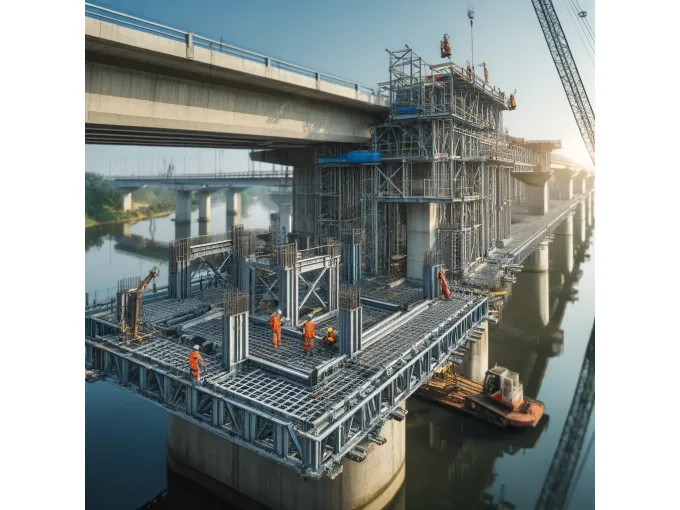Aluminum Formwork Systems: Revolutionizing Modern Construction with Efficiency and Durability
In the construction industry, speed, quality, and cost-efficiency are critical factors that determine the success of a project. One innovation that has transformed concrete construction is the aluminum formwork system. Known for its lightweight structure, durability, and reusability, aluminum formwork systems have become increasingly popular worldwide for residential, commercial, and infrastructure projects. This article explores the design, advantages, applications, and future prospects of aluminum formwork systems.
What Is an Aluminum Formwork System?
An aluminum formwork system is a type of modular formwork used to mold concrete structures, such as walls, slabs, and columns, with precision and speed. Unlike traditional timber or steel formwork, aluminum formwork is constructed from high-strength aluminum alloys that are lightweight, corrosion-resistant, and capable of withstanding multiple reuse cycles without deformation.
The system typically consists of panels, beams, props, connectors, and accessories that can be easily assembled and disassembled on-site. The modular design ensures that the formwork components can be reused across multiple projects, making it a sustainable and cost-effective choice for contractors.
Key Advantages of Aluminum Formwork Systems
Lightweight Yet Strong
Aluminum formwork is significantly lighter than steel, reducing labor intensity and simplifying transportation and installation. Despite its light weight, aluminum alloys provide excellent structural strength, ensuring that the formwork can withstand the high pressures of poured concrete.High Reusability and Durability
A well-maintained aluminum formwork system can be reused 300–500 times, depending on the concrete mix and handling. Its resistance to rust and corrosion allows long-term usage without compromising structural quality.Improved Construction Efficiency
Aluminum formwork systems enable rapid assembly and disassembly, reducing the time required for wall and slab construction. The precise modular panels minimize the need for on-site adjustments, ensuring uniform concrete surfaces and reducing finishing work.Cost Savings
Although the initial investment in aluminum formwork may be higher than timber, the long-term savings from reduced labor, material waste, and repetitive use make it highly cost-effective. Additionally, faster project timelines translate into lower overall project costs.Enhanced Safety
The lightweight panels and precise assembly mechanisms reduce the risk of accidents during installation. Integrated safety features, such as secure locking pins and guided connections, provide additional protection for construction workers.Eco-Friendly and Sustainable
Aluminum is fully recyclable, and repeated reuse of formwork panels reduces the consumption of timber and steel. This minimizes environmental impact while promoting sustainable construction practices.
Applications of Aluminum Formwork Systems
Residential Buildings
Aluminum formwork is ideal for high-rise apartments and housing complexes, allowing consistent wall thickness, smooth finishes, and rapid floor cycle times.Commercial Projects
Office buildings, shopping centers, and hotels benefit from aluminum formwork due to its precision, modularity, and ability to accelerate construction schedules.Infrastructure Projects
Bridges, tunnels, retaining walls, and other civil engineering projects utilize aluminum formwork to achieve high structural accuracy and durability under repetitive use.Industrial Facilities
Factories and warehouses often require large-scale concrete panels, which aluminum formwork can produce efficiently while maintaining structural integrity.
Technical Considerations
When choosing an aluminum formwork system, project managers should consider:
Panel Thickness and Load Capacity: Ensure the system can handle the specific concrete pressures.
Modular Design Compatibility: Check that panels, beams, and props fit seamlessly to reduce assembly errors.
Surface Finish Requirements: Smooth aluminum panels provide high-quality concrete surfaces, reducing finishing costs.
Project Scale and Reuse Potential: Evaluate long-term reuse possibilities to maximize cost-efficiency.
Future Trends in Aluminum Formwork Systems
With advancements in construction technology, aluminum formwork systems are expected to integrate more digital solutions. Building Information Modeling (BIM) compatibility, pre-engineered panel layouts, and smart tracking systems for inventory and reuse are trends that will enhance efficiency, reduce errors, and optimize resource management.
Additionally, innovations in alloy composition and coating technology are likely to improve the lifespan and environmental performance of aluminum formwork, making it an even more sustainable choice for the construction industry.
Conclusion
Aluminum formwork systems are transforming the way modern construction is carried out by offering lightweight, durable, and reusable solutions that save time, reduce labor costs, and ensure high-quality concrete finishes. From residential buildings to large-scale infrastructure projects, aluminum formwork provides unmatched efficiency, safety, and sustainability.
As the demand for faster, more sustainable, and cost-effective construction methods grows, aluminum formwork Accessories are poised to play a key role in shaping the future of the global construction industry. Contractors and engineers who adopt this technology can benefit from improved project timelines, reduced material waste, and safer working conditions, making aluminum formwork a smart investment for modern construction projects.
- Previous: None
- Next: Bagaimana Memilih Bekisting Balok Tanah yang Efisien dan Aman?



